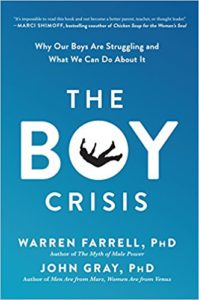
For dads, this will make you understand yourself (and feel understood) in a way that few things will—and not just about roughhousing, but how we approach the raising kids. Moms and wifes—please read too. 😉
At a time when “toxic” masculinity is putting old practices and playtimes on trial, this explanation of roughhousing—and by extension, the general mindset of dads—was so helpful for me. I hope it helps makes sense of things for you too.

Wrestle time was a staple every evening with my two boys for almost 10 years. And Cyd was always super supportive—I’m so grateful. But I don’t think she understood what it was all about. I DIDN’T EVEN UNDERSTAND WHAT IT WAS ALL ABOUT.
From Warren Farrell’s The Boy Crisis: Why Our Boys Are Struggling and What We Can Do About It.
Roughhousing: Dad as a Rough, Tough Cream Puff
During roughhousing, dads and kids are typically 100 percent energized, laughing, spontaneous, and yes, silly. The dads were almost always able to distinguish between their son or daughter being excited-scared and scared-scared. When the dad picked up any sense of his son or daughter being scared-scared, he baked off. And when the excitement led to kids getting to of control—which it usually did—or led to something unsafe, mean, cruel, or neglectful to a sibling or friend, the dad would pause and explain what needed to change: “Billy, how should you treating your sister?” Yes, Billy would often defend himself by complaining about his sister, but the kids translated their dad’s silence in response as “Figure out a better way to treat your sister or the roughhousing ends.” And Billy figure it out, or his dad ended the game.
After dads’ tendency to tease, nothing creates more conflict between moms and dads than dads’ much greater propensity to roughhouse. Roughhousing often scares mom, because her fear for her children’s safety is amplified by the appearance that dad is behaving like another kid, which mom translates as, “No one’s responsible here.”
The solution begins with dad. Dad should make clear to mom that 1) Roughhousing can coexist with him keeping an eye on the kids’ safety; 2) The kids themselves know that dad may pretend to be a kid, but always returns to dad when needed; and 3) What appears to be a bond of equals is never a bond of equals.
Almost all dad intuit their strength has two purposes: to excite and to protect. Playing with dad is like being on a roller coaster—kids are excited because they feel safe. They can take risks because they know the Clark Kent they’re playing with can change into Superman, even without a telephone booth.
Dad’s persona is a bit like a “rough, tough cream puff.” They toss their children into water, or into leaves; they perch them on their shoulders, and then pretend to stumble as the launch them from shoulder to bed. Kids sense dad may be “rough and tough” on the surface, but at the center he’s a cream puff. Well, not quite—a cream puff who can revert to tough again if required…
This about losing, crying, and moving on help us understand how moms and dads prepare their kids for life.
More on Roughhousing: Mom’s World; Dad’s World
Dad and Alex are play-wrestling. Dad typically let’s Alex “win” at the last second. But this time, Dad feels Alex isn’t giving it his all, so he doesn’t [let Alex win]. Alex starts crying. Dad teases Alex about being a bad loser, and after about a minute of letting Alex pout, playful turns him upside down, after which Alex is back in the saddle.
During that minute, though, Alex’s mom is thinking, “I could have predicted this would end up with Alex in tears!” Mom is angry at herself, feeling guilty for not fulfilling her responsibility of proactively protecting Alex.
Still feeling that guilt, Mom watches as Dad continues the same roughhousing after Alex has cried—after Dad “should have learned his lesson.” Moreover, she is dismayed the roughhousing is continuing as if nothing had happened—barely acknowledging Alex’s tears, being more dismissive than nurturing.
This triggers Mom’s second maternal emotion: a fierce resolve to not repeat the earlier mistake of allowing her child to get hurt. However, since she knows Alex loves and needs his father, she represses the impulse to stop the roughhousing outright, and bends over backward to give Dad a second change. She shares with Dad how and where she believes it’s safe for him to roughhouse, and how not to go too far.
While Mom is feeling pride for having supported—even improved!—Dad’s parenting, Dad experiences a different feeling.
A dad rarely says this—and mom’s can’t hear what dads don’t say—but in this context Dad feels that Alex’s occasional crying is a healthy part of a three-part cycle:
1. “losing”
2. crying
3. moving onAlex’s dad feels that some crying can be healthy if he is able to use it to teach Alex how winning in life involves losing and moving on—even crying and moving on (or falling and moving on; or not getting one’s own way and moving on). For most dads, this three-part cycle is unconscious, so moms never hear this perspective.
…When speaking to Mom, often Dad tries to underplay Alex’s crying. He doesn’t want to call it to Mom’s attention. However, this underplaying just reinforces Mom’s perception of him as dismissive and insensitive.
Last, if Alex feels a little extra crying will get Mom and Dad to compete to give him a few extra goodies—dessert and extra attention—he often exploits their tension like water seeping into a fissure on a roof. The gap between Mom and Dad widens further, and Alex unconsciously learns “victim power.”
…In different ways, moms, kids, and dad can each unwittingly contribute to the “killing” of dad. One reason is that while the risks of roughhousing are obvious, the benefits are not.
Researchers consistently find that fathers who spend time with their children give their children the gifts of self-control and social skills. Might the roughhousing component contribute to this? [The kids are learning] “emotional intelligence under fire.”
Dads, and moms, have you seen these dynamics? What would you add or change?
